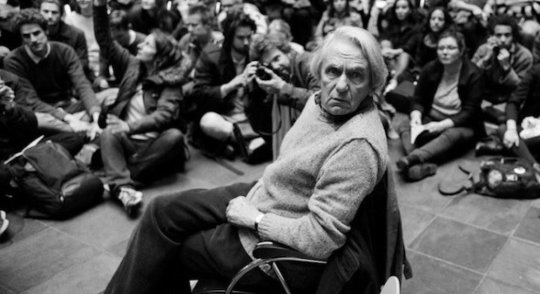#Rancière
Text
“The reasonable being is first of all a being who knows his power, who doesn’t lie to himself about it”
From The Ignorant Schoomaster
2 notes
·
View notes
Text

Serial Jacques Rancière (4)
"Sosiologi (Pierre Bourdieu) versus Anti-Sosiologi Rancièrean (1) "
Sosiologi adalah ilmu tentang mempelajari pola yang selalu berlangsung dan berulang meski dengan pergeseran-pergeseran yang membuatnya terilusikan sebagai sesuatu yang baru, elusif.
Anti-Sosiologi adalah sebaliknya. Ia mengungkap apa-apa yang elusif di dalam ilmu Sosiologi, mendedahnya, memampangkan sedemikian terbuka fakta-fakta (yang ditemukan bersama ilmu Sosiologi di dalam pola-pola hidup masyarakat).
Istilah "anti-sosiologi" muncul di jurnal ilmiah Dennis Büscher-Ulbrich, "Introducing Disagreement: Rancière's Anti-Sociology and the Parallax of Political Subjectivity and Political Economy (of Racism)". Di situ disebutkan bahwa para sosiolog, Rancière menggunakan Bourdieu sebagai contohnya, telah melakukan sesuatu yang reduktif dan tidak praktis secara politik.
Apa maksud perkataan Rancière ini?
Maksudnya adalah ilmu Sosiologi yang idealnya menjelaskan pola hidup masyarakat malah melakukan sesuatu yang dikenal dengan istilah "deterministik".
Deterministik merupakan sesuatu yang tidak baik bagi sebuah ilmu karena alih-alih mencerahkan pemahaman kita, ia malah menggelapkan, karena tujuannya yang hendak menutup daya kritik kita sebagai manusia bernalar, dengan cara mengatakan bahwa kita tidak memiliki kapasitas dan kapabilitas untuk mengambil keputusan secara sadar dan bermoral.
2 notes
·
View notes
Text
Rancière, el filósofo que piensa lo político desde la igualdad de las inteligencias. El Pais.
En estos momentos en los que estamos urgidos a pensar sobre la inteligencia artificial, sería propicio atender a la misma concepción de la inteligencia humana y cómo desde perspectivas jerárquicas de ésta se han justificado estructuras de dominio. Os dejo un artículo publicado en el periódico EL PAÍS, España, que puede ser un incentivo para replantear las democracias mismas.
pdf-ranciereDescarga

View On WordPress
0 notes
Text

Currently reading: Jacques Rancière, The Intervals of Cinema
#study#studyblr#studygram#studyspo#book#books#bookblr#booklr#bookstagram#books & libraries#reading#books and reading#booklover#bookworm#inspiration#jacques rancière#cinema#philosophy#film#films#film studies
259 notes
·
View notes
Text
“In Borges, as in Plato, there is a good way and a bad way for words to circulate. The bad way is the way of literature, which only circulates in order to block exchange: an interminable book, words that try to say everything. The good way is no longer, as in Plato, the way of the master’s words. It is the way of the shared dream. The sterile imagination is the imagination that produces a dream no one else can dream. Flaubert likes to enter into Emma’s ‘young girl’s dreams,’ but he refuses to be dreamed by her in turn, just as the Proustian narrator refuses to be dreamed by Charlus or Swann. The good way is the way of a dream that can be dreamed in turn, that already has been dreamed an incalculable number of times because it is itself a bit of the dream that is the world.”
– Jacques Rancière, The Politics of Literature
32 notes
·
View notes
Text
Analysis paralysis hits hard for millennials and gen z, I think. Everything seems so complex, especially when we’re all so *aware* of it all the time, that any small thing we have to do day to day seems pointless, and anything bigger seems impossible to do well enough. “But I worry and I give money and I feel useless behind this computer, and that’s just barely scratched the surface of my mind” - as the great sage of our times, Hayley Williams, tells us.
This is especially bad if we have memories of doing wrong in the past. Whether real or imagined, this can be traumatic, and make being absolutely perfect or else doing nothing at all seem like the only option.
But perfection is impossible. We all know this on some level - there’s simply too much complexity to any problem for us to even learn about all of it within our lifetime, let alone understand it, especially since everything is always developing along with us. Some forethought is often necessary to avoid negligence, especially when addressing bigger problems, and we must always learn from our mistakes to heal from them (which can take some time), but at some point action is necessary - to be there for people, to make some difference, to try. Sometimes that’s the really important thing, even if it doesn’t achieve any of what you tried to achieve - you showed that you cared, and you may inspire others to try too, and together you can achieve more than either could alone.
Accepting imperfection is more than just practically useful though. It means also being more compassionate, accepting that just as you can’t achieve perfection, neither can others - and they may even disagree with you! Just like you might sometimes not even be sure what perfection means to you, and it may be that you need to try something to work it out. You can learn from your failures, sometimes you can learn about past failures through making more, and you can learn from other people’s efforts. Thinking that you could know the answers perfectly, that you need to in order to act, makes it hard to learn from action happening right in front of you.
You don’t need a perfect knowledge of psychology or first aid to comfort and care for someone. You don’t need a perfect knowledge of a subject to write and share some ideas about it (to get meta). You don’t need to perfect knowledge of politics, society, and economics to advocate for or act on behalf of a conviction about how the world should be. Thinking that you ever could is pretty arrogant anyway, and it seems silly when confronted head on, but I do think that so much of despair comes from an implicit belief that we should have perfect knowledge before acting.
There was the beginnings of a revolution in France in 1968, and it failed. The Marxist leadership refused to believe that students could be revolutionary. They failed to see the productive effect they were having, that they were already reaching out to others, and so they refused to support them. They thought that conditions had to be perfect for any change to happen, and so they couldn’t learn from the creativity of the students who were already making a better world. If they had, they may have achieved something like what they said they wanted.
Importantly, when it comes to political questions, we don’t need to be aiming to solve the whole world’s problems at once. That’s too big a problem! No one person can do that, and there’s no group capable of doing it that we could align ourselves with. Start small, solve smaller problems in ways that align with your principles. This does immediate good, but also shows other people (and you) that there are other ways of doing things, and people willing to do them. This builds groups that can address bigger things, and provides a space to learn ways of acting that couldn’t have been imagined before people started trying things. “A theory cannot be developed without encountering a wall, and a praxis is needed to break through.” - Gilles Deleuze
Learning is not a project that can be completed, it’s a frame of mind - being open to a world which will always change and people whose capabilities will always surprise you. Accepting that people, including yourself, will always be different from how you want them to be, and accepting and supporting them in their projects anyway, not when they’re perfect, but when they’re headed in the right direction.
#analysis paralysis#philosophy#politics#anxiety#situationism#may 68#paramore#jacques rancière#communism#marxism#louis althusser#gilles deleuze#climate anxiety#activism
10 notes
·
View notes
Text

many such cases
#m#9 pages into the emancipated spectator already know how useful this is about to be for my minecraft roleplay analysis endeavors seriously#considering kissing rancière with tongue
4 notes
·
View notes
Text
Rhetoric is perverted poetry.
Jacques Rancière, The Ignorant Schoolmaster
2 notes
·
View notes
Quote
Ce que la Commune dit d'abord c'est la capacité des gens que l'on considère comme incapable. On connait l'adresse de l'AIT, rédigé par Karl Marx qui parlait de ces ouvriers qui montaient à l'assaut du ciel. Monter à l'assaut du ciel ça veut véritablement montrer qu'ils sont intelligents, montrer qu'ils savent ce qu'ils font, qu'ils peuvent organiser un monde.
L'horreur de la Commune pour la bourgeoisie de l'époque et finalement pour beaucoup de gens encore maintenant, c'est que tout d'un coup ces gens dont on pense que tout ce qu'ils ont à faire c'est de travailler, éventuellement lutter, faire des grèves ... Ceux sont des gens qui pensent, qui écrivent, qui lisent. Ceux sont des gens qui sont capables de construire un monde. C'était très fort à l'époque de la Commune cette idée qu'au fond les ouvriers par tout un travail d'auto-éducation, étaient capable d'organiser un monde. Un monde de la production où l'on produisait et on échangeait les produits, un monde du savoir où il n'y avait plus la séparation entre intellectuels et les manuels.
La Commune de Paris c'est aussi un idéal d'enseignement qu'on appelle aujourd'hui républicain : les communards ont instauré un enseignement laïque, gratuit, obligatoire, mixte, à la fois intellectuel et manuel.
Jacques Rancière - Entretien sur France Inter
4 notes
·
View notes
Text
Car la question politique est d'abord celle de la capacité des corps quelconques à s'emparer de leur destin.
For the political question is first and foremost the ability of any body to take control of their destiny.
Jacques Rancière, Les paradoxes de l'art esthétique, in Le spectateur émancipé, 2008.
1 note
·
View note
Text
“ He would have none of that fearful liberty guaranteed by the agreement of the laws of thought with the laws of language and those of society. Liberty is not guaranteed by any preestablished harmony. It is taken, it is won, it is lost, solely by each person’s effort. And reason is not assured by being already written in language’s constructions and the laws of the city. Language’s laws have nothing to do with reason, and the laws of the city have everything to do with irrationality. If there is a divine law, thought itself, in its sustained truthfulness, alone bears witness to it. Man does not think because he speaks— this would precisely submit thought to the existing material order. Man thinks because he exists. ”
From The Ignorant Schoolmaster
0 notes
Text

Serial Jacques Rancière (2)
"Logika Genre dan Modernitas"
Perlu kita ingat, bahwa Leonardo da Vinci merupakan pelukis yang lahir di sebuah pulau besar sekaligus "state-union" yang kini kita sebut Uni-Eropa.
Maka, berbekalkan ingatan sederhana ini, kita jadi tahu, bahwa apa-apa yang akan kita diskusikan tentang Leonardo da Vinci, termasuk khususnya lukisan yang enigmatik dan kontroversi (juga mahal), "Mona Lisa", perlu selalu kita kembalikan pada sebuah dan sebentuk konteks bernama "Tradisi Barat".
Dalam tradisi Barat, tentu kalian sudah tidak asing lagi sama yang namanya "demokrasi", ya, kan?
Jacques Rancière punya sebuah pendapat tentang demokrasi. Dia bilang, demokrasi adalah sebuah paradoks. Artinya, kita tidak bisa memahami demokrasi sesederhana bebas berpendapat, voting, pemilihan presiden, dan seterusnya.
Demokrasi merupakan sebuah operasi logika yang rumit. Rumitnya bagaimana, nih? Rumitnya adalah ia bukan sesuatu yang tunggal dapat didefinisikan sebagai sebuah kata yang bisa dimaknai dengan praktik-praktik yang tadi saya sebut di paragraf sebelum ini, tapi ia juga merupakan kejadian-kejadian sosial yang tidak ada rumus Matematika-nya, alias random banget, atau fuzzy banget.
Demokrasi merupakan produk tradisi Barat, khususnya Yunani kuno. Jacques Rancière memang banyak mengambil pemikirannya dari ide-ide filsuf Yunani kuno seperti Plato dan Aristoteles.
Pernah dengar tentang kategori lukisan sebagai "fine art" dan "liberal art"? Atau "commercial art"? "Fine art" adalah karya seni yang dianggap sebagai karya seni murni, atau sebuah karya seni yang penciptaannya tidak lain dan tidak bukan hanya untuk keindahan semata, tidak untuk memenuhi pesanan pasar, atau diciptakan dengan paradigma modern atau berfokus pada hal-hal yang berbau pasar: jumlah, harga, tawar-menawar, komoditi, dsb. "Liberal art" adalah karya seni yang dianggap sebagai karya seni yang melakukan revolusi, atau perlawanan kepada otoritas yang berwenang.
Nah, masuk ke kategori yang mana kah lukisan Leonardo da Vinci, "Mona Lisa"?
Jelasnya, ia masuk ke kategori "commercial art", sih, karena Leonardo da Vinci tidak menginisiasi sendiri lukisan "Mona Lisa", seorang suami dari perempuan bangsawan Italia bernama Lisa del Giocondo. Memang benar pada akhirnya Leonardo da Vinci tidak menyerahkan hasil akhir lukisan tersebut kepada si pemesan, dan di sini kita tentu kesulitan menyebutnya sebuah "commercial art" karena tidak ada informasi mengenai pertukaran "currency" atau mata uang dengan lukisan tersebut (singkatnya, Leonardo da Vinci tidak dibayar, tidak menerima bayaran, tidak terjadi kegiatan berupa sebuah pembayaran, baik itu berupa sebuah uang muka maupun dan terlebih-lebih lagi pelunasan).
Di sini lah teori-teori Rancière tentang "logika genre" menjadi jawaban atas kompleksitas ini.
Ingat soal "mimesis"? Teori estetika-politik Rancière yang mengatakan bahwa sebuah karya seni merupakan kerja sama antara "poiesis" dan "aisthesis" (Kalau lupa, baca ulang di sini ya: )?
Tindakan Leonardo da Vinci yang tidak menyerahkan hasil akhir lukisan "Mona Lisa" kepada yang memberi komisi, maksudnya yang melakukan "commission" atau yang memesan, merupakan sebuah tindakan politis, meskipun bisa jadi da Vinci tidak bermaksud demikian.
Ini merupakan apa yang disebut Rancière sebagai "Redefinisi politisitas (politicity) Aristotelian".
2 notes
·
View notes
Text
<< Le prétendu "effet de réel" est bien plutôt un effet d'égalité. Mais cette égalité n'est pas l'équivalence de tous les individus, les objets et les sensations sous la plume de l'écrivain. Il n'est pas vrai que toutes les sensations soient équivalentes, mais il est vrai que n'importe laquelle d'entre elles peut provoquer pour n'importe quelle femme des classes inférieures la vertigineuse accélération qui la rend susceptible d'éprouver les abîmes de la passion. >> --- Jacques Rancière, Le Fil perdu (2014), La Fabrique, p. 26
1 note
·
View note
Text
Efe Baştürk – Foucault’dan Rancière’e Gelecek Demokrasi (2023)
Bu kitap çağdaş felsefenin mimarları Foucault, Derrida, Agamben, Rancière ve Nancy’nin politik düşüncesinin izini sürüyor.
Foucault’da delilik ve kapatılmadan Rancière’in ‘Cahil Hoca’sına, Derrida’da tekillik ve konukseverlikten Agamben’de dil ve sessizliğe uzanan bir yol izliyor.
Bu kitaptaki ‘çağdaş’ düşünürlerin ortak problemi, polisin (kent devletinin) başlangıçtan beri idealize edilmiş…

View On WordPress
#2023#Efe Baştürk#Fol Kitap#Foucault’dan Rancière’e Gelecek Demokrasi#Giorgio Agamben#Jacques Derrida#Jacques Rancière#Jean-Luc Nancy#Michel Foucault
0 notes
Text
“Such people use obscure words to disguise the triteness of what they have to say and retort that there has been a misunderstanding as soon as you think you have understood what they are saying – that is, precisely, something trite.”
– Jacques Rancière, The Politics of Literature
9 notes
·
View notes
Text
The Hell Without Poetry
I started reading Proletarian Nights by Jacques Rancière, about contradictory aspirations held by artisanal workers in early 19th century France. One of the most interesting points so far are the fact that some workers had a culture of emulating bourgeoise fashion and not saving money, both to differentiate themselves from the domestic servants they felt they were superior to, and to signal that they deserved the same privileges as the bourgeoisie but rejected capitalist ethics of accumulating in order to exploit others.
I’ve just gotten into the famous Gauny section, where Rancière goes off an a tangent about this philosophical joiner (someone who makes wooden building components). The first of his books I read was The Ignorant Schoolmaster, which similarly takes up a single historical figure in order to develop their ideas into a universal, ahistorical frame by blending his voice with theirs. I find the idea really interesting, and it makes me wonder if I could do the same for the people I interviewed for my dissertation. I like how it deconstructs the boundary between historical actor and theorist, emphasising that all people are both, but it only works of course if the people you’re quoting are doing a substantial amount of philosophising. I also don’t want to lose marks for a stylistic gambit.
One of Gauny’s ideas is that work is work, always demeaning no matter what its content is. Rancière points out that this is similar to the philosophy of a preacher at the time, who valorised work for its essential self-sacrifice (Max Weber pricks up his ears), because it allows our body to fulfil its debt created by the wage given by the employer. This is obviously ideologically beneficial to the status quo because valuing just particular aspects of work rather than work it and of itself would suggest that those parts should be expanded i.e. that work can be better or worse and might be improved.
However, Gauny twists the message by separating the effect it has on the body from the effect on the soul. He admits that there is a pleasure to physical self-sacrifice - even though hard work of the sort he was doing can have awful long-term consequences, there’s pleasure in the oblivion you can reach in the arduous routine of it - but he emphasises that it kills the soul by not giving you breathing time to sit and contemplate, discuss ideas, and make art. There’s a beautiful section where Gauny says
“Ah, Dante, you old devil, you never traveled to the real hell, the hell without poetry!”
This speaks to the ideas at the heart of Rancière’s entire project: that everyone aspires to critically engage in the arts, and that the extent to which do is not overdetermined by class position. His project in this book in particular is to demonstrate that there is no pure working class - there is frequent infighting within and between professions and genders, and their morality is often inspired by the bourgeoisie.
In fact, one of the most interesting parts is that many of the workers start seriously questioning the status quo only after they’re visited by bourgeois do-gooders, but rather than take on the ideas of these champagne socialists uncritically, they use them to inspire new ideas. Rather than expecting a new world to come from one place, we should recognise that novelty is always a result of the melding of difference. It actually makes me think of the fact that so many of the progressive ideas developed in Europe, from Rousseau to Marx, were inspired by Native American philosophies (David Graeber & David Wengrow’s book, The Dawn of Everything, has a great section on the possible influence on Rousseau).
The aspirations of people like Gauny to write poetry, to come up with new ideas based on a variety of sources, was largely unrecognised or dismissed when Rancière wrote this in the ‘80s. He was frustrated that not only did capitalists view working people as beneath of that sort of thought, but Marxists saw it as counter-revolutionary and therefore unbecoming. Rancière was disillusioned with Althusser, who’s structuralist Marxism he saw as not leaving any space for people to resist their circumstances, instead being overdetermined by class. I don’t know Rancière’s stance on free will, but as a rather dogmatic determinist even I find that frustrating, as if we aren’t influenced by so much else which can give rise to disruptive convergences. Basically, people are more complicated than that! Any supposedly emancipatory philosophy with a single vision of what the working-class should be is doomed to failure, as Rancière well knew from witnessing the dismissal of the student protests of ‘68 be dismissed as “not real revolution”.
Rancière saw in Gauny a way out of this structuralist trap, where by taking on the high-minded ideas of the more romantic bourgeoisie and reinterpreting them with a personal need to act against the system, new ideas could be created and used to disrupt the distribution of the sensible, or the matrix of acceptable ideas - most important of which was the idea of who is capable of having such ideas. This concept is actually where my name comes from!
I wonder if we’re losing this time to contemplate even more today, with the spectacle invading so much of our lives - social media being the quintessential example. This is not such a danger if we’re using it to chat to people, but if we’re just scrolling… there’s not much thinking going on there. 😅 Guy Debord, in the ‘50s, was already talking about capital colonising our everyday life, and this stealing of attention, our time to think and talk and create and have ideas, seems to be the worst consequence of it.
#jacques rancière#marxism#karl marx#david graeber#capitalism#alienation#philosophy#social theory#sociology#history#france#french history#poetry#dante#work#equality#social media#guy debord#spectacle#society of the spectacle
3 notes
·
View notes